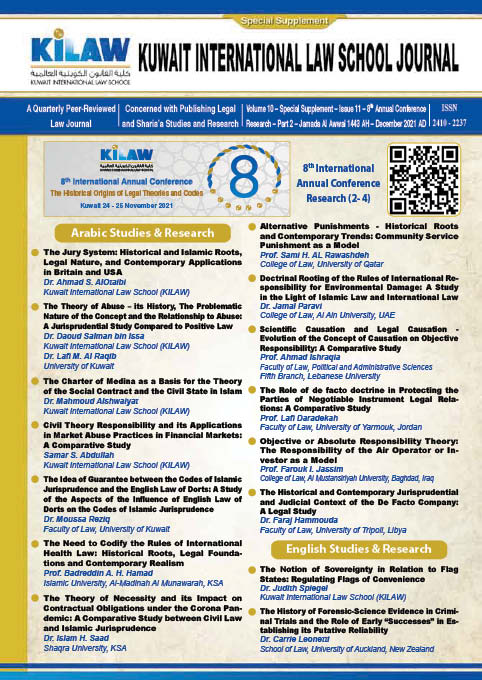| Volume 10 |
Jamada Al Awwal 1443 |
| Issue 11 | December 2021 |
| ISSN 24102237 |

Editorial
Law in the Historical and Civilizational Context (2-4):
International Declarations and Laws – Principles and Charters Designed to Regulate Cooperation, Coexistence, and Renunciation of Wars between Nations: Towards More Commitment and Respect
By: Prof. Badria A. Al-Awadi
Editor-in-Chief
{O humanity! Indeed, We created you from a male and a female, and made you into peoples and tribes so that you may ˹get to˺ know one another. Surely, the most noble of you in the sight of Allah (God) is the most righteous among you. Allah is truly All-Knowing, All-Aware.} (Sourat Al-Hujurat, verse 13)
Law in the Historical and Civilizational Context (2-4)
Chief-in-Editor Prof. Badria A. Al-Awadi
{O humanity! Indeed, We created you from a male and a female, and made you into peoples and tribes so that you may ˹get to˺ know one another. Surely, the most noble of you in the sight of Allah (God) is the most righteous among you. Allah is truly All-Knowing, All-Aware.} (Sourat Al-Hujurat, verse 13)
Relations between states constitute a mirror reflecting the development of the role of laws in regulating life within the international community, a role that intersects in many aspects with the role of law in local societies and within a single state, but differs from it according to its parties and units. International law views states as equals, grants them sovereignty over their lands, territorial waters, and airspace. It does not allow aggression against them or interference in their internal affairs. The rules of this law appeared successively in the form of charters, agreements, and declarations of principles and rights, after a difficult period of labour that witnessed tragic wars and conflicts, which claimed the lives of tens of millions of people in the First and Second World Wars, in addition to the wars of colonialism and aggression.
Many of these rules find their origins and roots in historical theories and legal codes, which arose in the midst of conflicts between earlier nations to control resources and impose sovereignty, and in the predominance of the logic of wars, invasion and aggression, and then developed gradually and cumulatively in a development that took many centuries, to establish peace instead of war, and coexistence instead of conflict, adopting dialogue and negotiation instead of weapons to settle existing problems.
Heavenly laws in general, and Islamic law in particular, as it is the final, wisest, fairest, and most comprehensive of all messages and laws, has contributed to raising awareness of the importance of the values of coexistence and understanding between human societies, and rejecting division and aggression, as the Almighty said in a decisive revelation:
{And cooperate in righteousness and piety, but do not cooperate in sin and aggression}, (Surat Al-Ma’idah, verse 2)}. He also said: {And do not transgress, for God does not love transgressors} (Surat Al-Ma’idah, verse 87).
These provisions were mirrored on the ground by the example of the state of Medina established by the Messenger of God, may God’s prayers and peace be upon him, and later in Mecca after its conquest, and then in the rest of the cities that the Muslims opened and ruled, where the values of brotherhood and affection, justice and equality prevailed, and security, stability and prosperity spread in these zones for a period of time, due to adherence to the values and principles included in the provisions of the Sharia, and the jurisprudence reached by the caliphs, scholars and jurists.
The two historical legal schools, Latin and Anglo-Saxon, also contributed to the emergence of many theories and rules of international law, based on the experience of the Roman Empire and the principles and ideas of Roman philosophers, and then the philosophers and thinkers of the Age of Enlightenment, some of whom lived through dark periods in the history of civil and inter-war wars in Europe and the United States of America. And other wars of colonialism, aggression, and control in the eighteenth and nineteenth centuries, especially the first and second world wars in the twentieth century.
The development of international law culminated in the emergence of a number of declarations, covenants, conventions, and protocols, which followed World War II, most notably: the United Nations Charter (1945), the Universal Declaration of Human Rights (1948), the Geneva Conventions (1949), and its subsequent protocols, and others. International efforts have also been active to formulate and adopt multilateral agreements aimed at encouraging the resolution of problems and disputes through dialogue and negotiation and by avoiding wars.
There is no doubt that these efforts and initiatives have achieved some results, but data on the ground indicate the limited impact of the repository of international laws and agreements in curbing the aggressive tendency inherent in a number of international parties that do not hesitate to use force to achieve their interests, and to interfere in internal affairs of countries, and impose their conditions by force. In addition to the fact that this situation has led to instability in many regions of the world, it has engendered more and more doubts about the binding force and even the very existence of the rules of international law, due to the increasing violations and disrespect of them by the major powers, based on the fact that laws require force to compel the implementation of its provisions, which is not available for many of the rules and provisions of international law, especially when major powers are involved, as confirmed by successive facts.
In view of the common needs of human societies towards strengthening international peace and stability in order to address the real problems that threaten the future of humanity (climate – hunger – depletion of resources …), many parties, at the forefront of whom responsible states and governments, as well as international organizations and jurists of international law, are invited to dwell again on reviewing mechanisms for activating respect for the rules and provisions of international law, and the need to adhere to them to include everyone without exception.
Content
Arabic Studies and Research
The Jury System: Historical and Islamic Roots, Legal Nature, and Contemporary Applications in Britain and USA
Dr. Ahmad Suliman AlOtaibi
Associate Professor and Head of Public Law Department
Kuwait International Law School (KILAW)
The theory of Abuse – its History, The Problematic Nature of the Concept and the Relationship to Abuse: A Jurisprudential Study Compared to Positive Law
Dr. Daoud Salman bin Issa
Assistant Professor of Comparative
Jurisprudence and Islamic Studies
Kuwait International Law School (KILAW)
Researcher
Dr. Lafi Mohammed Al-Raqib
Assistant Professor
Faculty of Education
Kuwait University
The Charter of Medina as a Basis for the Theory of the Social Contract and the Civil State in Islam
Dr. Mahmoud Alshwaiyat
Associate Professor of Comparative
Jurisprudence and Islamic Studies
Kuwait International Law School (KILAW)
Abstract
Civil Theory Responsibility and its Applications in Market Abuse Practices in Financial Markets: A Comparative Study
Samar Salah Abdullah
Teaching assistant
Kuwait International Law School (KILAW)
The Idea of Guarantee between the Codes of Islamic Jurisprudence and the English Law of Dorts: A Study of the Aspects of the Influence of English Law of Dorts on the Codes of Islamic Jurisprudence
Dr. Moussa Rezig
Associate Professor of Civil Law
Faculty of Laws and Judicial Studies, Department of Systems
Faculty of Law, Kuwait University
The Need to Codify the Rules of International Health Law: Historical Roots, Legal Foundations and Contemporary Realism
Prof. Badreddin Abdallah Hassan Hamad
Professor of Public International Law
Faculty of Laws and Judicial Studies, Department of Systems
Islamic University, Al-Madinah Al Munawarah, KSA
The Theory of Necessity and its Impact on Contractual Obligations under the Corona Pandemic: A Comparative Study between Civil Law and Islamic Jurisprudence
Dr. Islam Hashem Saad
Assistant Professor of Civil Law, Department of Law
College of Science and Human Studies at Dawadmi,
Shaqra University, KSA
Alternative Punishments – Historical Roots and Contemporary Trends: Community Service Punishment as a Model
Dr. Sami Hamdan AL-Rawashdeh
Professor of Criminal Law
College of Law, University of Qatar
Doctrinal Rooting of the Rules of International Responsibility for Environmental Damage: A Study in the Light of Islamic Law and International Law
Dr. Jamal Paravi
Associate Professor of Public International Law
College of Law, Al Ain University, UAE
Scientific Causation and Legal Causation – Evolution of the Concept of Causation on Objective Responsibility: A Comparative Study
Prof. Ahmed Ishraqia
Professor of Private Law
Director of the Faculty of Law, Political and Administrative
Sciences, Fifth Branch, Lebanese University
The Role of De Facto Doctrine in Protecting the Parties of Negotiable Instrument Legal Relations: Comparative Study
Prof. Lafi Daradekah
Professor of Commercial Law
Ex-Dean of Faulty of Law,
Yarmouk University Legal Advisor, Jordan
Objective or Absolute Responsibility Theory: The Rresponsibility of the Air Operator or Investor as a Model
Prof. Farouk Ibrahim Jassim
Professor of Commercial Law
College of Law, Al- Mustansiriyah University
Baghdad, Iraq
The Historical and Contemporary Jurisprudential and Judicial Context of the De Facto Company: A Legal Study
Dr. Faraj Hammouda
Associate Professor of Civil Law
Faculty of Law, University of Tripoli, Libya
English Studies and Research
The Notion of Sovereignty in Relation to Flag States Regulating Flags of Convenience
Dr. Judith Spiegel
Assistant Professor of Public International Law
Kuwait International Law School (KILAW)
The History of Forensic-Science Evidence in Criminal Trials and the Role of Early “Successes” in Establishing its Putative Reliability
Dr. Carrie Leonetti
Associate Professor, School of Law
University of Auckland, New Zealand

